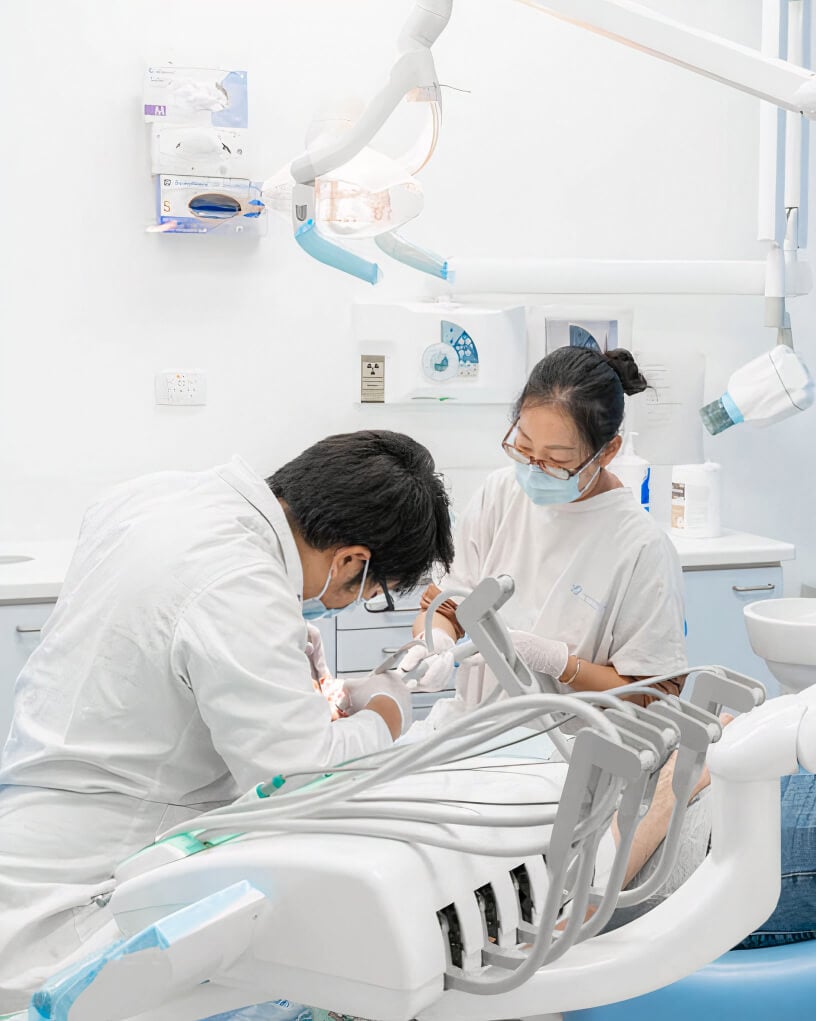WELCOME TO OUR DENTAL CARE | DENTAL PRACTICE IN DRUMMOYNE NSW
WELCOME TO OUR DENTAL CARE | DENTAL PRACTICE IN DRUMMOYNE NSW


The procedure for dental extraction is usually quite simple. Once you have arrived and filled out the medical history form, your dentist will confirm the tooth to be extracted and discuss any risks which may affect the treatment or the treatment outcome.
We will ensure you feel comfortable during the procedure by administering an anaesthetic which should make you feel numb to any pain.
Once the tooth has been removed, we will apply some cotton gauze that you will be able to bite down on.
When you were a child, nothing is as exciting as losing a tooth as you’d often receive a reward from the tooth fairy. However, as you grow older, losing a tooth can get a little more complicated. The procedure can be nerve-racking, but it’s easier if you’re fully prepared for this procedure.
Before your tooth extraction with our Drummoyne dentists, we make sure that you’re prepared.
You probably have a lot of questions about what will happen before, during, and after your procedure. So, it’s best to let your dentist know all of this during your consultations. It’s better to take down notes of all questions you have in mind ahead of time and bring them up to your dentist to get some answers. In this way, you’ll understand exactly what to expect from the procedure. Moreover, it will help you to avoid getting anxious.
Here are some examples of helpful questions you may ask:
You can jot them down in a notebook or on your phone. The best dentists will take the time to answer your questions.
Don’t forget to share your medical history with your dentist before the procedure. They will need this to know what kind of anaesthetic to use during the procedure as well as the medications to give you after.
So, be comprehensive and do not leave any details out from your dentist. Below are some specifics that you need to share:
Unfortunately, these conditions can make a patient more vulnerable to infections. So, bring your medical history up to your dentist for your own benefit.
Most times, patients won’t be able to drive immediately after the procedure because of the anaesthesia used. So, it’s best to arrange your transportation ahead of time. You can do so by arranging for your family member, a friend, or a taxi to drive you home after.
You can also consider having someone accompany you during the procedure itself.
Patients should not eat anything for 12 hours before the surgery. This can help reduce the risk of nausea during and after the procedure. If you are having a local anaesthetic, you may not need to fast as long, so check with your doctor before the procedure. Inform them, too, if you have a condition that prevents you from fasting, such as diabetes.
It's also important to remember that you can't smoke for 12 hours before and 24 hours after the surgery. This helps to avoid slowing down the healing process and increases your risk of "dry socket," a serious condition that requires immediate medical attention.
It is important to wear clothes you feel most comfortable in during a tooth extraction. So consider putting on your favourite sweats, loose shirts, and jeans for optimal comfort since the procedure itself might take time.
Here are other things you should also keep in mind:
All dentists should provide you with aftercare instructions to help you take care of yourself and the site of extraction afterward.
You can request your aftercare instructions in advance to stock up on food and drink you may need. Prepare your refrigerator with soft foods and pick up your medication ahead of time. You can also arrange for someone to do so on the day of your appointment. You should also prepare a comfortable spot to lie down with your head propped up.
After your extraction, we will discuss your postoperative care so you will be able to make sure your wound heals as quickly and properly.
If you continue to have issues with bleeding, we will usually ask you to return to the dental clinic to be assessed and treated if necessary. Generally, healing after extractions occurs quite quickly. There are some reasons why healing may occur more slowly. Your dentist at Our Dental Clinic Drummoyne will discuss any reasons which may have the possibility of affecting healing with you on the day.

Once an adult tooth has been extracted, it will not grow back. If the dental extraction has occurred at the front, there will be a large aesthetic issue as well as bringing about a lisp. At the back of the mouth, there will be the loss of a pair of large chewing molars which will affect your ability to eat and likely speak.
Even if your teeth seem like solid structures, they actually still move around the jaw in response to pressure. Once an extraction occurs, the teeth on either side will collapse into the unsupported space like books without bookends. The teeth on top will also grow in the opposing space. Once this occurs, aesthetic as well as functional compromises follow. It is also very difficult to reverse this process without expensive and specialized orthodontics.
That’s why it’s important to speak to your dentist about replacement options as quickly as possible. The replacement options include having a denture, a bridge, or an implant. After your dental extraction in Drummoyne, your dentist will discuss them with you.
Should you need an Extraction, please contact us at 0415 191 049.

